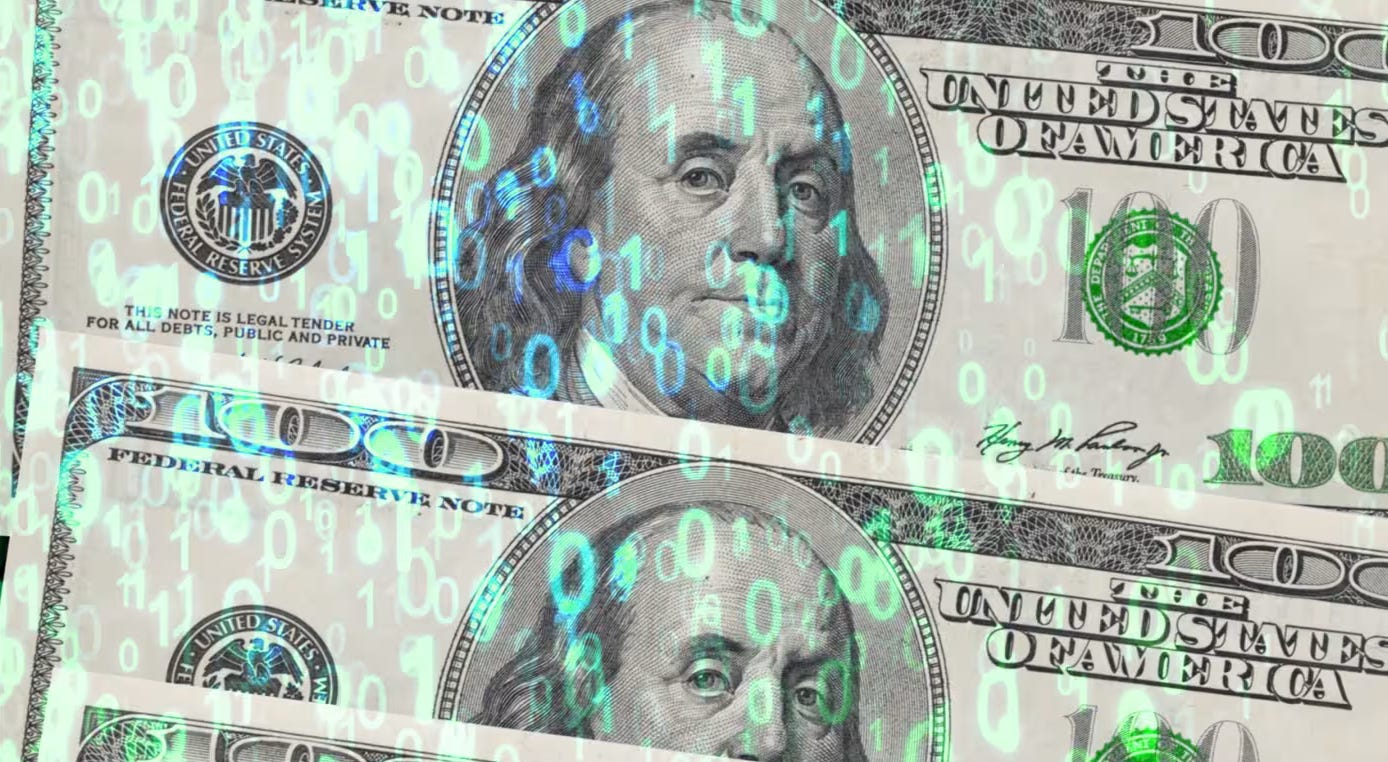Rotten apples
The line between preview and misrepresentation is razor thin. And just as dangerous.
Issue № 129 | London, Sunday 16 March 2025
Read on to learn why:
① Good marketing’s most valuable by-product is trust.
② Breaking a promise may be irredeemable.
③ Financial firms are again innocent until proven guilty.
④ If you’re a little fintech starting to build a stablecoin platform, it’s too late.
⑤ Language evolves constantly, if very slowly.
⑥ The office should be a place you want to go, not have to go.
⑦ AI isn’t going to replace your creativity or skills.
📸 But first, flashback to December when I told you that the decline of the UK’s capital markets is a deep-rooted cultural problem. This week, a group of City executives and financiers has cooked up a plan to revamp the Alternative Investment Market.
What's new
Apple admitted this week that the Apple Intelligence features it has been leaning on as the unique selling point for its latest devices won’t actually be ready until sometime “in the coming year.” The revelation prompted one of the company’s most respected and level-headed observers, John Gruber, to launch a blistering attack, as 9-to-5 Mac reports.

In short:
“Apple recently had to admit that plans for three new Siri features are ‘going to take us longer than we thought’ – with no real explanation, and no new delivery date. Crucially, these are the very features which promise to make Siri truly intelligent:
Personal context (understanding things like ‘When is my mom’s flight landing?’)
On-screen awareness (being able to do things like ‘Add this address to her contact card’)
In-app actions (for example, ‘Make this photo pop, and add it to my Miami 2025 note’)
“The company also quietly deleted an iPhone 16 ad in which it promoted these features. However, it continues to promote these features on its website, albeit with new disclaimers.”
“On Daring Fireball, Gruber says the reality of any product claims can be judged on a four-point scale:
Demonstrated, but nobody allowed to try it for themselves
Hands-on demos for media in very controlled conditions
Beta versions anyone can try for themselves
Shipped features
He says the level below this – concept videos of features which cannot even be carefully demonstrated – is just bullshit. And that’s where Apple is with the above Siri features.”
Why it matters
Since this story was published, things have only got worse for Apple. Bloomberg reported on a subsequent internal meeting in which Apple senior director Robby Walker, who oversees the AI division, called the delay “ugly” and “embarrassing”, and promised a fix.
① Tim Cook has probably created more shareholder value than any CEO in history so I’m not suggesting for a second that his position is in any danger as a result of this debacle. There’s no denying though that this week is a pivotal low point for Apple, a company that is lauded both for the quality of its products and its marketing. My law degree is decades behind me now but I still well remember the Trade Descriptions Act. In simple terms, it mandates that your product has to do what you claim it does. Apple told people that its latest generation of iOS and iPadOS devices would include Apple Intelligence. It’s now clear they won’t, not as described anyway. So, this story matters because, even if that’s not a breach of the law, it’s certainly a breach of good marketing’s most valuable by-product: trust.
In technology sales, trust often hinges on a demo. But, as Gruber, writes:
“What Apple showed regarding the upcoming ‘personalised Siri’ at WWDC was not a demo. It was a concept video. Concept videos are bullshit, and a sign of a company in disarray, if not crisis.”
Therein lies the problem. In B2B technology sales in particular, buyers are used to what one of my first bosses taught me was called ‘smoke and mirrors’, the process of knitting together some unfinished features in an effort to demo a preview of what the final product will eventually do. Given the long sales cycles and collaborative nature of software development for B2B financial services clients, that’s become broadly expected and accepted. What’s not accepted, what breaks any semblance of trust, is vapourware - or to put it another way: claiming your product will do what you only hope it will.
② The mistake Apple made is not delaying a launch (as we’ve already covered, better to be late and right than early and wrong). It’s not even pre-announcing features that aren’t ready yet; there’s nothing wrong with previews. The mistake is breaking a promise. By specifically advertising its new devices as including Apple Intelligence and distinguishing Apple Intelligence from generic AI with ‘personal context ‘, ‘on-screen awareness’, and ‘in-app actions’ (features only Apple, by making both hardware and software could ever pull off), the company made a promise it has failed to live up to. People bought its latest devices because they thought they were getting Apple Intelligence. They weren’t.
What to do about it
Take action
Marketing teams have a natural exuberance. They’re keen to tell stories, to share a vision with the market. Encourage yours to create collateral and demos as best they can before the product is finalised. That’s healthy and - in the case of B2B tech - arguably part and parcel of bringing a final product to market.
But, for the sake of your brand’s reputation, for the sake of the trust your customers have in you, be crystal clear about the difference between vision and aspiration, demo and concept video, promise and bullshit. Keep the right side of that line.
Get help
Two ways I can help you: 1) hire me as a full-time member of your team; or 2) use InMarketing, an advisory service for senior leadership teams in finance and tech.
🔎 Audit 🧭 Strategy 🖋️ Positioning ✅ Planning 🤷🏻 Problem-solving ☎️ Counsel
Top stories
The other articles that are worthy of your time.
FINANCIAL SERVICES
FCA drops plan to name and shame firms under investigation
③ Financial firms are again innocent until proven guilty.

“The Financial Conduct Authority will no longer move forward with its proposal to introduce a public interest test for naming companies. Instead, the FCA will maintain its current approach, which only allows for disclosure in exceptional circumstances.”
“The watchdog had already softened its initial stance on the ‘name and shame’ policy. In November, it revised its proposals, allowing firms to receive a draft announcement along with a ten-day window to respond before any public disclosure. If the FCA had decided to proceed after considering these responses, companies would have then granted an additional two days' notice before publication.”
“However, despite these concessions, the proposals continued to face criticism, with many urging the regulator to abandon the plans altogether.
The backlash intensified last month when a House of Lords committee called on the FCA to halt its initiative until industry concerns were fully addressed. The committee went so far as to label the proposal an "abject failure", criticising the way the consultation process had been handled.
TECHNOLOGY
Banks and fintechs join ‘stablecoin gold rush’
④ If you’re a little fintech starting to build a stablecoin platform, it’s too late.
“Some of the world’s largest banks and fintechs are rushing to launch their own stablecoins, aiming to grab a slice of a cross-border payments market they expect will be redrawn by cryptocurrencies. Last month Bank of America signalled it was open to issuing its own coin, joining established payments providers such as Standard Chartered, PayPal, Revolut and Stripe in targeting a business dominated by cryptocurrency groups Tether and Circle.”
“Their enthusiasm has been fuelled by growing acceptance among regulators around the world that stablecoins, designed to hold a constant value of a dollar per coin, could become a more accepted part of the financial system. That shift, after regulatory hostility to Meta’s Libra stablecoin six years ago, has been given further impetus by US President Donald Trump’s fervent embrace of cryptocurrencies.”
“Large banks are growing increasingly confident pushing into the industry as regulations emerge. US politicians are debating bills in Congress that set out standards for stablecoins, giving banks, companies and ordinary consumers more confidence to use the tokens.”
MEDIA & MARKETING
The New Yorker embraces (some) modern language
⑤ Language evolves constantly, if very slowly.
“This week, the top copy editor of The New Yorker announced that the magazine had completed a ‘reëxamination’ of its house style. […] The magazine, which doesn’t look a day over 100, is famous for its attachment to heterodox spelling and punctuation rules. So Mr. Boynton’s decision to announce changes to the style guide in The New Yorker’s daily newsletter on Monday was noteworthy. The revolution arrived in two squat paragraphs containing two diereses, three em dashes and four pairs of parentheses.”
“The magazine will abandon ‘Web site,’ ‘in-box,’ and ‘Internet’ in favour of the more familiar ‘website,’ ‘inbox’ and ‘internet.’ ‘Cellphone’ will be one word, rather than two.”
“The keepers of the magazine’s house style have been purposely slow to make concessions to the internet age. ‘We don’t want to make a change and then change it back,’ he said. ‘We want to make sure it’s a lasting change that is elsewhere in the world and that people are familiar with and comfortable with’.”
WILDCARD
Atom Bank wants to inspire staff back to the office
⑥ The office should be a place you want to go, not have to go.

“The boss of Atom Bank said he wants to inspire his staff back to the office as he announced plans to relocate its headquarters to Newcastle.”
“Mullen said: ‘While many companies are backtracking on past commitments, and forcing their people back to the office, we’re doing the opposite – we’re creating a social space that brings people together because it’s inspiring, not because it’s mandated’.”
“Atom’s operating profit surged 600 per cent year on year to £27m, while its costs up ticked up just four per cent, which it said demonstrated ‘the success of its efficient, sustainable and scalable business model’.”
Off cuts
The stories that almost made this week’s newsletter.
FINANCIAL SERVICES
‘💍 Nuclear bomb’ ruling on car finance could spur UK bank deals
🇩🇰 J. Safra Sarasin Group acquires majority stake in Saxo Bank
🤑 Goldman pay surges 30% for handful of top executives
🧑🏼⚖️ Perella Weinberg trial lifts veil on bitter feud among top bankers
👏🏻 Rathbones hires ex-Coutts private client boss as wealth CEO
TECHNOLOGY
🗽 The British fintechs hoping to crack America
💰 ServiceNow confirms Moveworks acquisition for $2.85 billion
🇨🇭 SIX merges Digital Exchange SDX into securities services group
👮🏻♂️ The fintech-bank marriage is broken. Can better regulation fix it?
🦾 $120 Billion fintech firm trains chatbot—on customer data
MEDIA & MARKETING
🤖 How CMOs can stay ahead in an AI-driven marketing landscape
📰 Financial Times chief executive John Ridding steps down after two decades
🏷️ The impact of AI on marketing agency pricing
⬇️ CMOs at Fortune 500 brands declined in 2024: Spencer Stuart
📲 How to use LinkedIn Specialisms to boost your B2B brand advocates
The last word
⑦ Mark Cuban on artificial intelligence:

“AI is never the answer. AI is the tool. Whatever skills you have, you can use AI to amplify them. […] AI doesn’t know a good story from a bad story. You need to be creative. Trust me, I can create AI-generated videos. They’re still gonna suck.”
Don’t settle for marketing.
Aspire to InMarketing.
Wishing you an innovative week,
P.S. Turns out, there is life after the City.








